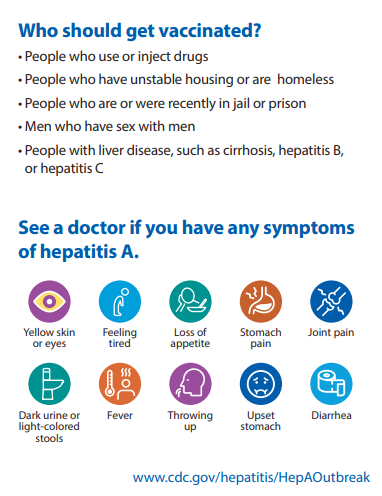
Since 2012, hepatitis A cases have been on the rise in the U.S. Since the outbreaks were first identified in 2016, the CDC denotes 30 states have publicly reported cases with a total of 26,276 cases nationally, including 15,819 hospitalizations and 268 deaths (data is as of Sept. 27, 2019.)
Hepatitis A is a vaccine-preventable, communicable disease of the liver caused by the Hepatitis A virus (HAV). It is usually transmitted person-to-person and spreads when a person unknowingly ingests the virus from objects, food, or drinks contaminated by small, undetected amounts of fecal matter from an infected person. It can range from a mild illness lasting a few weeks, to a severe illness lasting several months. Symptoms can appear abruptly and can include fever, fatigue, loss of appetite, nausea, vomiting, abdominal pain, dark urine, diarrhea, clay-colored stools, joint pain, and jaundice.
Hepatitis A Visual Fact Sheet:
How Can I Protect Myself?
Everyone can protect themselves from Hepatitis A by:
- Getting vaccinated through your primary health care provider. The Hepatitis A vaccine is highly effective at preventing Hepatitis A.
- Washing your hands with soap and water before eating, drinking, or handling food.
- Use your own towels, toothbrushes, and eating utensils.
- Don't share food, drinks, smoking/vaping materials or products, syringes, or other types of drug paraphernalia with other people.
How Serious is Hepatitis A?
According to the CDC, most people who get Hepatitis A feel sick for several weeks, but they usually recover completely and do not have lasting liver damage.
In rare cases, Hepatitis A can cause liver failure and death; this is more common in people older than 50 and in people with other liver diseases.
Can FCDPH Give Me A Vaccine for Hepatitis A?
If you are a part of the following priority populations, you are eligible to receive a free Hepatitis A vaccination at the Forsyth County Department of Public Health:
- People who are homeless or transient
- People who use injection AND non-injection illegal drugs or substances
- People who have close contact, care for, or live with someone who has Hepatitis A
- And men who have sexual encounters with other men
- People recently incarcerated
What if I Think I Have Hepatitis A?
Anyone with symptoms of Hepatitis A should contact a healthcare provider immediately and should not prepare food for others. A doctor can confirm if someone with symptoms has Hepatitis A with a blood test.
I've Already Had a Hepatitis A Infection, Am I Still at Risk?
No. Once you recover from hepatitis A, you develop antibodies that protect you from the virus for life. An antibody is a substance found in the blood that the body produces in response to a virus. Antibodies protect the body from disease by attaching to the virus and destroying it.
How is Hepatitis A Treated?
Unvaccinated people who have been exposed recently (within 2 weeks) to the Hepatitis A virus should get the Hepatitis A vaccine to prevent severe illness. To treat the symptoms of hepatitis A, doctors usually recommend rest, adequate nutrition, and fluids. Some people will need medical care in a hospital. It can take a few months before people with Hepatitis A begin to feel better.
Need More Information?
More information on Hepatitis A can be found on the NC DHHS website at https://epi.dph.ncdhhs.gov/cd/hepatitis/hepa_outbreak.html and on the CDC website at https://www.cdc.gov/hepatitis/hav/index.htm.




